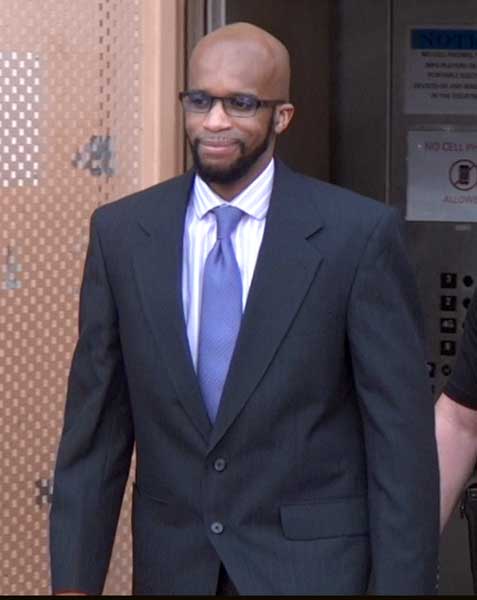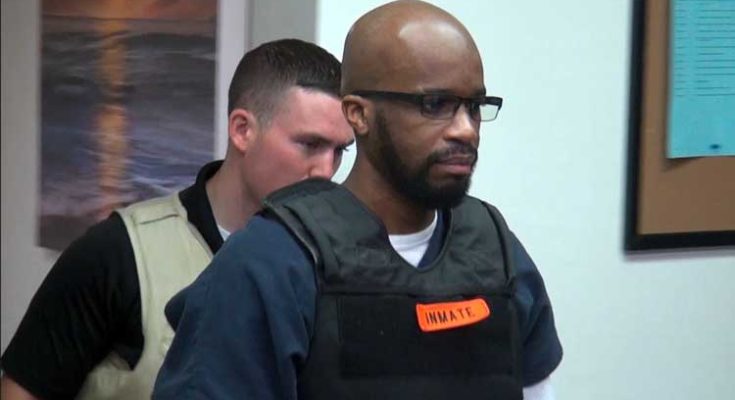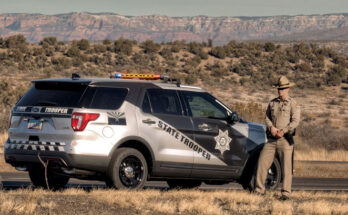Jon Johnson File Photo/Gila Herald: Salih Abdul-Haqq Zaid stares ahead blankly after being sentenced to 15 years in prison in May 2018. Zaid was granted a new trial after winning a ruling during his appeal for the murder of Jared Michael Garcia.
By Jon Johnson
PHOENIX – It’s been less than four years since Jared Michael Garcia, 35, drew his last breath after being gunned down in the parking lot of the Bull Pen bar, however, the man convicted of his killing could see his freedom sooner than later.
In June, the Arizona Court of Appeals granted Salih Abdul-Haqq Zaid’s appeal regarding a ruling during his trial for the murder of Garcia on April 26, 2017, and reversed his convictions and sentences. Zaid had been found guilty of manslaughter and sentenced to 15 years in prison. He was also found guilty of two counts of aggravated assault, endangerment, disorderly conduct with a deadly weapon, and discharging a firearm within city limits.
Zaid has now been awarded a new trial that will likely start in the first quarter of 2021. The prosecution, led by Graham County Attorney-elect L. Scott Bennett, and Zaid’s attorney, Dennis McCarthy, are scheduled to meet Thursday in Graham County Superior Court Judge Pro-TemTravis Ragland’s courtroom to set a start date for the new trial.
(UPDATE) On Thursday morning Judge Ragland set Zaid’s new jury trial to begin April 5, 2021. The trial is expected to last 2.5 to three weeks. Zaid is no longer an inmate with the Arizona Department of Corrections, Rehabilitation, and Reentry, and is being held in the Graham County Adult Detention Facility and is bondable.
McCarthy requested a $25,000 to $30,000 bond, which was contrasted by Bennett’s request to place a cash-only $250,000 bond. Bennett argued while the case is no longer a first-degree murder case, Zaid has no ties to the community, no job, and – since he was convicted of manslaughter already once – that there is a high probability of Zaid being convicted of shooting a person to death again. Judge Ragland then set Zaid’s bond at $250,000 cash only, which should keep him incarcerated until the matter is adjudicated since McCarthy described Zaid as being “destitute” unless someone else puts up the money for his release.
Judge Ragland also asked if a possible settlement was off the table, which McCarthy advised his client was open to discussions. That surprised Bennett, who said he would be open to a settlement conference. Before the first trial, Zaid rejected a plea deal for manslaughter that offered a range of 7 to 13 years. If convicted of manslaughter again, the maximum term he can be sentenced to is 21 years. A status hearing was set for Feb. 3 at 3 p.m. to see if there is a possibility the case will settle before seeing the inside of a courtroom again. (END UPDATE)
In its ruling, the Arizona Court of Appeals also listed that Zaid cannot be tried for murder in the first degree or murder in the second degree under the Double Jeopardy Clause. The Clause in the Fifth Amendment to the U.S. Constitution prohibits anyone from being prosecuted twice for substantially the same crime. The relevant part of the Fifth Amendment states, “No person shall . . . be subject for the same offense to be twice put in jeopardy of life or limb . . . . ” Since Zaid was acquitted on the murder in the first-degree charge and had a hung jury on the murder in the second-degree charge, the Arizona Court of Appeals ruled that the Double Jeopardy Clause would be in effect if the state tried to try him on either of those same charges. That means the most Zaid can get if he is not successful in his new trial is the same charge of manslaughter he is currently serving.

Before Zaid’s first trial began, then Graham County Superior Court Judge Corey D. Sanders granted then Graham County Chief Deputy County Attorney L. Scott Bennett’s motion to preclude McCarthy from presenting evidence of Garcia’s prior violent acts and reputation for violence. The Gila Herald pointed out both men’s previous history of assaults in an article prior to the start of the trial (Zaid murder trial set to begin jury selection – Gila Herald March 5, 2018) and advised that Garcia’s assaults had typically been bar fights and Zaid’s assaults had been misdemeanors.
In its June ruling, the Arizona Court of Appeals published that Judge Sanders had erred in not allowing Garcia’s history to be presented as evidence and advised the error was not harmless as it could have been used to support Zaid’s assertion of acting in self-defense.
“Because the trial court erred in precluding Zaid from presenting reputation and opinion evidence of the victim’s violent character, and we cannot conclude that the error was harmless, we reverse Zaid’s convictions and sentences and remand for a new trial,” the ruling stated.
After a two-week trial and nearly two full days of deliberation, a jury found Zaid guilty on March 20, 2018, of manslaughter, two counts of aggravated assault, endangerment, disorderly conduct with a weapon, and unlawfully discharging a weapon within city limits. The jury acquitted Zaid on a charge of murder in the first degree, and could not agree on a charge of murder in the second degree.

On May 15, 2018, Judge Sanders came out of retirement to sentence Zaid to 15 years in prison for his manslaughter charge. Judge Sanders also sentenced Zaid to 10 years on each aggravated assault charge, 2.5 years for endangerment, 2.5 years for disorderly conduct with a weapon, and 1.5 years for unlawfully discharging a weapon within city limits. All of the charges were deemed to run concurrent (at the same time) however, and do not add any time to the largest, 15-year sentence.
With being eligible for early release of one day for every seven served, Zaid’s sentence should have kept him incarcerated until 2030. At the time, Bennett had argued for the maximum sentence of 21 years, while Zaid’s attorney, Dennis McCarthy, had argued for the minimum sentence of 4 years. If Zaid is found guilty of manslaughter again, the new judge will have the same range in sentencing guidelines.
McCarthy had argued that the shooting was justified self-defense, but during interrogation by police Zaid seemingly admitted that he had committed the act out of revenge for being “punked” earlier in the night at the Bull Pen bar. The shooting occurred after Zaid had left the premises, appeared to return to his residence, and, according to the prosecution, retrieved his AK-47 assault rifle. Zaid then returned to the Bull Pen bar and the night ended with him shooting Garcia in the parking lot.
Witness testimony also advised that Zaid did not have the AK-47 in his truck when he was initially at the bar. The witnesses advised Zaid had shown them his sound system in his truck earlier and that things only turned after Zaid instigated an altercation by using a racial epithet toward the Hispanic Garcia. After the incident, Zaid was told to leave by bar employees.
Upon his return, however, witnesses advised Zaid lured the men out to his truck, where he retrieved the AK-47 and shot Garcia as Garcia held up his hands and turned to run. After being caught, police located the AK-47 in Zaid’s truck, along with four high-capacity magazines that each held approximately 40 rounds, according to court transcripts.
Zaid’s attorney said his client acted in self-defense from hostile bar patrons. Despite being offered a plea deal for manslaughter that offered a range of 7 to 13 years, Zaid rejected the deal and was ultimately convicted of manslaughter and was given a sentence of 15 years. At the start of the trial, prosecutors even advised the court that they would have settled the case if the defendant would have taken a plea deal for 7 to 10.5 years.
“This is such a sad, sad case,” McCarthy previously said in court.







